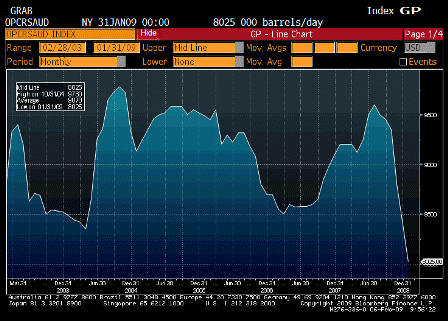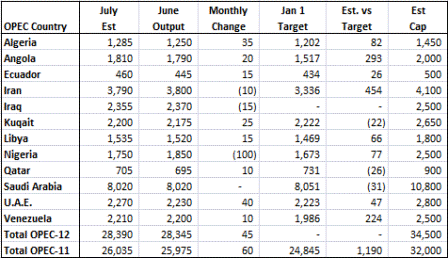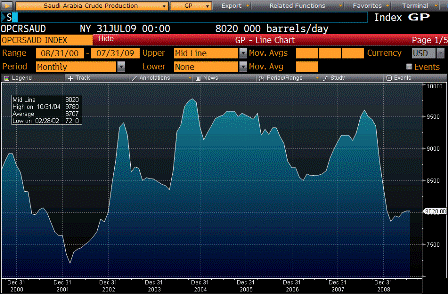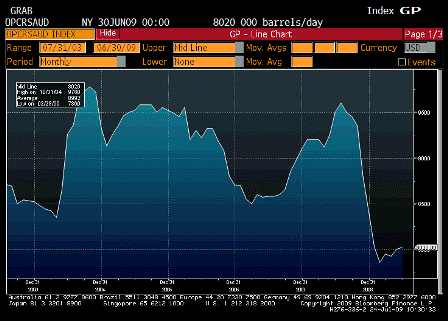“There is a need for an increase to replace the loss from Libya,” the delegate said. “Oil prices are too high; $100 oil is scaring people.”
Saudi Arabian Oil Minister Ali al-Naimi waded into the debate, noting that OPEC is ready to raise production to meet any increased demand.
Tag Archives: Saudi Production
the Mideast, the Saudis, and our markets
First, I’ve been pretty quiet on the mideast goings ons.
I’ve been watching intently from the time Egypt made headlines,
and have yet to see anything of particular consequence to us, beyond oil prices.
I’ve yet to come up with any channel to world aggregate demand, inflation, etc. apart from oil prices.
Seems all moves in stocks and bonds have been linked directly or indirectly only to actual and potential changes in crude oil and product prices.
And the mainstream has yet to realize that ultimately the Saudis- the only producer with excess capacity, continues as price setter, at least until their excess capacity is gone.
So the price of crude oil remains set by decree, and not market forces.
And markets don’t yet seem to know that.
Credit the Saudis for outsmarting the world on that score.
They say they don’t set prices, but let the market set price, as they only set spreads to benchmark market prices they post for their refiners.
The world completely misses the simple difference between the Saudi’s reaction function as a price setter, and prices set competitively in the market place.
That’s like the Fed saying they don’t set $US interest rates, because they have a reaction function that guides them.
So what does that mean?
It means the price of crude will come down only if the Saudis want it to come down (assuming they do have excess capacity).
And my best guess is that their survival strategy includes a lower price of oil.
They will play the maestro with grand gesture and international ‘faux diplomacy’ with ‘high level’ behind the scenes goings ons with pledges to come to the rescue with promises of production increases to replace any lost output due to the crisis, making it clear that they are going the extra mile and taking extraordinary measures to ensure the western economies both won’t see any supply disruptions and prices will be contained. Making it clear that we owe them for their selfless, gargantuan, efforts and expenditures of political capital on our behalf.
It’s all a big show to ingratiate themselves to the West in the hopes of getting the western support needed to sustain their position of power.
And the west will never realize that prices went up only because the Saudis raised their posted prices under cover of their reaction function that the west mistakes for ‘market forces,’ and that prices will go down only as the Saudis simply lower their posted prices, as they continue to play us for complete fools.
Much like China does to us because we think we need to sell our Tsy secs to fund our federal spending.
And with lower crude prices we go ‘risk off’ and much of the recent moves in other markets reverse.
The other possibility is that the Saudis don’t cut price, maybe because they decide they want the increased revenues to sustain control domestically with increased distributions to their population.
One way or another, it’s all their political decision, and we don’t even understand how it works, which reduces the odds that whatever influence we might have will be used to our ultimate benefit.
Before the early 1970’s the price of oil was set by the Texas Railroad Commission, who kept it relatively low and stable, fueling growth with reasonable price stability, while govt policy fostered relatively high levels of employment and low output gaps.
Since the hand off to the Saudis in the early 1970’s, when circumstances allowed them to take over as swing producer/price setter, prices have increased dramatically with very high levels of volatility, disrupting the world order and fostering today’s very high levels of unemployment and massive output gaps, as govts struggle with fears of inflation and seemingly no understanding of the process that’s got us into that mess.
And now with the world turmoil perhaps largely a function of mass unemployment, and govts with no idea how to keep that from happening, the pendulum is shifting from order to chaos.
Saudi Arabia in talks to boost oil output
Right, as swing producer/monopolist that’s what they necessarily do- set price and let quantity adjust.
But if quantity demanded exceeds their ability to pump they lose control of price on the upside.
>
> (email exchange)
>
> On Thu, Feb 24, 2011 at 9:43 AM, Greg wrote:
>
> Just like you say about the Saudi’s…..
>
Saudi Arabia in talks to boost oil output
By David Blair, Jack Farchy and Javier Blas
February 24 (FT) — Saudi Arabia is in “active talks” with European oil companies to meet the production shortfall left by Libya, the clearest indication to date that the leader of the Opec oil cartel is about to boost supplies to stop further rises in the oil price, which surged to near $120 a barrel on Thursday.
Riyadh is asking “what quantity and what quality of oil they [the European refiners] want,” a senior Saudi oil official said on condition of anonymity.
Oil traders said the talks signalled that Saudi Arabia realised that the political crisis in Libya was now an oil supply crisis and that the kingdom needed to act quickly and decisively to stop oil prices hurting the global economic recovery.
“You can only expect the price to go up. It is fear of the unknown. The risks are all to the upside,” one senior oil trader said. “Saudi Arabia needs to respond.”
The kingdom is considering two options for increasing supplies. The first would be to boost Saudi production and send more crude through the kingdom’s East-West pipeline, which links the Gulf region with the Red Sea port of Yanbu, for shipment to Europe.
Another possibility, which is currently only being “studied”, would be a swap arrangement, whereby West African oil intended for Asian buyers is redirected to Europe, with Saudi Arabia stepping in to supply the Asian customers.
West African oil, such as Nigerian crude, is very similar to the gasoline-rich Libyan oil, traders said, noting that West Africa is geographically closer to Europe than Saudi Arabia.
“Right now, there are active talks in order to implement what is needed,” the Saudi oil official added. He stressed that the kingdom retained spare capacity of some 4m barrels a day – more than than double Libya’s entire output which totalled 1.58m b/d in January, according to the International Energy Agency.
Saudi Arabia has not yet decided whether to increase its output in response to Libya’s crisis, the official added, saying it would depend on the requirements of European oil companies.
If it proved necessary for Saudi Arabia to produce more, “then that will happen, there’s no problem at all”, he added.
Traders believe Saudi Arabia has the capacity to boost production by at least 1m b/d with just 24 hours notice, meaning that if a decision was adopted now, the oil tankers could be arriving in Europe within 10 days.
The move by the world’s largest oil producer comes as Eni of Italy, the most active foreign oil company in Libya, said on Thursday that oil production from the North African country has plunged to just a quarter of normal levels.
Increasingly panicked buying drove the price of Brent crude futures, the global pricing benchmark, up 6.7 per cent to a peak of $119.79, the highest since August 2008. Traders and investors feared that the near-total shutdown of Libya’s oil industry would leave the global oil market with little supply cushion should the political crisis spread to another major Middle Eastern oil producer.
Paolo Scaroni, Eni chief executive, on Wednesday made the most pessimistic public assessment to date of the impact of the Libyan crisis on the country’s oil output, saying the country was producing only 400,000 b/d, compared with 1.6m b/d before the violence erupted.
“The real phenomenon is there are 1.2m barrels less on the market,” Mr Scaroni told reporters in Rome, adding that the loss of Libyan production was “not a huge thing, but it is something and there is also a sense of general uncertainty in the region which can be the trigger for speculation”.
The shortfall means the world market is enduring its biggest oil crisis since hurricane Katrina in 2005 knocked out most US oil production in Gulf of Mexico.
Traders believe that Saudi Arabia has the capacity to increase production and also the oil of the right quality to meet the shortfall. The kingdom produces so-called Arab Extra Light and Arab Super Light, which through blending could be made to resemble the high-quality, light, sweet oil produced by Libya.
The Saudi move comes as oil prices reached levels that many economists believe will dramatically slow the global economy and potentially trigger a double-dip recession. Oil prices hit an all-time high of nearly $150 a barrel in mid-2008.
Iraq to increase crude production
This would be a game changer if they do it and pump all that:
BAGHDAD
Petroleumworld.com, Dec 14, 2009
Iraq struck deals with several foreign energy giants to nearly triple its oil output in an auction that ended on Saturday, as the country bids to become one of the world’s biggest energy producers.
Major agreements were reached with Russian firm Lukoil and Anglo-Dutch company Shell over giant fields during the two-day sale, while contracts were also awarded to China’s CNPC and Malaysia’s Petronas.
“Iraq’s oil production will reach 12 million barrels per day (bpd) within the next six years,” Oil Minister Hussein al-Shahristani told reporters after the auction. “That is the highest production level of the world’s oil-producing countries.”
[top]
OPEC July Crude Output Up 45,000 Bbl/Day to 28.39 Mln
Saudi production
Looks like demand is steady at current prices which seem to be where they currently want prices to be.
[top]
Drop in crude
>
> (email exchange)
>
> Warren, Seems like we’ve seen a tiny repeat of what happened during
> the ( Mosler coined) Mike Masters inventory liquidation last summer.
> That is, crude oil drops and takes everything else down with it all driven
> by the fear of increased scrutiny regulation on commodity speculation.
> Do you agree? NY Times article a few days ago.
>
Yes, also the fact that it’s done it for the last few years about this time gets the specs going in that direction as well. If there’s nothing ‘fundamental’ going on this year it could quickly reverse as Saudis hold price and let quantity adjust.
Also, lower crude makes dollars harder to get overseas (our oil bill goes down) which tends to firm up the dollar.
[top]
Saudi production falls
Saudis will let production fall to levels consistent with their price target.
That’s what swing producers do.
Unless demand drops so far they can’t let output fall further.
So far independent world demand forecasts don’t show that happening.

[top]




